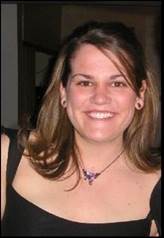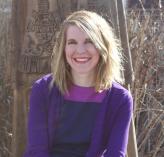 NCSE rafters examining Vulcan's Anvil, one of Grand Canyon's geological wonders. Photo by Josh Rosenau, 2014.
NCSE rafters examining Vulcan's Anvil, one of Grand Canyon's geological wonders. Photo by Josh Rosenau, 2014.NCSE is pleased to announce the winners of the third teacher scholarships on our regular raft trip through the Grand Canyon: Marie Story of Whittier Middle School, Sioux Falls, South Dakota, and Robyn Witty of Roncalli High School, Indianapolis, Indiana. Both teachers will receive an all-expenses-paid eight-day raft trip through the Grand Canyon, guided by a member of NCSE's staff and joining twenty other NCSE members and supporters who purchased seats on the trip. (Two seats are still available for the 2017 trip.) The funds for the teacher scholarships were donated by generous members and supporters of NCSE.
"This trip will be the adventure of a lifetime for Story and Witty," explained NCSE's Steve Newton, a geologist and NCSE's guide on the raft trip. "They will get the chance to relax a little on the Colorado River after a hard year's work helping to ensure the scientific literacy of the rising generation. But," he added, "they shouldn't get too comfortable, because soon they'll be hard at work again. The Grand Canyon is the greatest geology teaching lab in the world, and Story and Witty will never have a better chance to learn about geological processes up close and personal — laying their own hands on rock layers deposited before the first multicellular fossils, touching with their own fingers the traces of fossils left hundreds of millions of years ago, and seeing with their own eyes how plate tectonics, erosion, volcanoes built up and carved down the landscape." (For reflections from recipients of the teacher scholarships in previous years on what they learned from their Grand Canyon trips, see the posts on NCSE's blog from Brandon Haught, Crystal Davis, Scott Hatfield, and Alyson Miller.)

Marie Story is a physical science teacher in Whittier Middle School in Sioux Falls, South Dakota. She previously taught elementary school and middle school science for ten years at the Pierre Indian Learning Center in Pierre, South Dakota, where, as she recounted in her application, she was struck by the diversity of student preconceptions about evolution — while many of her students accepted a Christian version of creationism, "more believe[d] that ... their ancestors followed Iktomi, the trickster, out of [Wind Cave] in the dead of winter." She concluded, "I was there to teach science. When you bring creation stories into science, it is no longer a science lesson." As she told Steve Newton in a Q&A posted on NCSE's blog, she subsequently developed a technique of teaching evolution "backward" to circumvent student misconceptions about evolution. In her service on the committee to write a new set of state science standards for South Dakota, she was a strong advocate for the inclusion of a forthright treatment of evolution along the lines of the Next Generation Science Standards. The standards were adopted in 2015.

Robyn Witty teaches biology and environmental science at Roncalli High School in Indianapolis, Indiana. She brings to her classroom her experience working in a scientific research laboratory: as she told Steve Newton in a Q&A posted on NCSE's blog, her experience "gives me a strong understanding of how critical inquiry labs are in the high school setting. ... Students are more likely to fall in love with science if their natural sense of curiosity. They also better understand science as a process, if they have to walk through the experimental design process themselves." In her application, she identified the biggest challenge to teaching evolution and climate change in her school as the general lack of scientific literacy: "The majority of my students' exposure to evolution and/or climate change comes from sensationalized news stories of controversy, political statements, and Facebook or YouTube." She explains that she addresses the challenge with both a detailed unit on the nature of science at the beginning of the school year and — since she teaches at a Catholic high school — a discussion of the Catholic church's acceptance of evolution and climate change.
Dozens of teachers applied for the two seats, but Story and Witty stood out, not just for their excellence in the classroom, but also for their efforts to make their communities safer for science and science education. "We were gratified by the response to this scholarship, and can't wait to offer more scholarships in future years," commented NCSE's executive director Ann Reid. "There were so many teachers we wished we could have brought with us, and we're grateful to everyone who donated to the scholarship fund (to which donations are still welcome). When communities, scientists, and teachers come together, great things happen."
